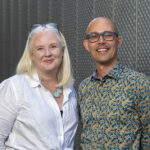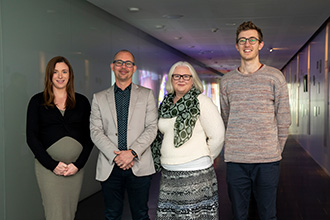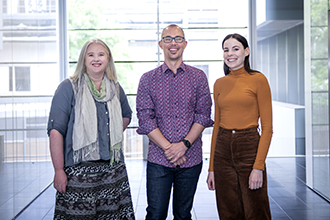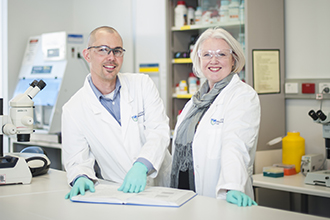Chandler NJ, Davey AS, Elazar A, Weinstein JY, Nguyen JV, Trenker R, Cross RS, Jenkins MR, Call ME, Fleishman SJ, Call MJ. De novo -designed transmembrane domains tune chimeric antigen receptor function. Acta Crystallographica Section A: Foundations and advances. 2023;79(a2):10.1107/s2053273323086722
Ramesh S, Park S, Im W, Call MJ, Call ME. T cell and B cell antigen receptors share a conserved core transmembrane structure. Proceedings of the National Academy of Sciences of the United States of America. 2022;119(48):10.1073/pnas.2208058119
Elazar A, Chandler NJ, Davey AS, Weinstein JY, Nguyen JV, Trenker R, Cross RS, Jenkins MR, Call MJ, Call ME, Fleishman SJ. De novo-designed transmembrane domains tune engineered receptor functions. eLife. 2022;11:10.7554/elife.75660
Trenker R, Wu X, Nguyen JV, Wilcox S, Rubin AF, Call ME, Call MJ. Human and viral membrane–associated E3 ubiquitin ligases MARCH1 and MIR2 recognize different features of CD86 to downregulate surface expression. Journal of Biological Chemistry. 2021;297(1):10.1016/j.jbc.2021.100900
Davey AS, Call ME, Call MJ. The Influence of Chimeric Antigen Receptor Structural Domains on Clinical Outcomes and Associated Toxicities. Cancers. 2020;13(1):10.3390/cancers13010038
Ramesh S, Park S, Call MJ, Im W, Call ME. Experimentally Guided Computational Methods Yield Highly Accurate Insights into Transmembrane Interactions within the T Cell Receptor Complex. The Journal of Physical Chemistry B. 2020;124(46):10.1021/acs.jpcb.0c06403
Chandler NJ, Call MJ, Call ME. T Cell Activation Machinery: Form and Function in Natural and Engineered Immune Receptors. International Journal of Molecular Sciences. 2020;21(19):10.3390/ijms21197424
Bridgford JL, Lee SM, Lee CMM, Guglielmelli P, Rumi E, Pietra D, Wilcox S, Chhabra Y, Rubin AF, Cazzola M, Vannucchi AM, Brooks AJ, Call ME, Call MJ. Novel drivers and modifiers of MPL-dependent oncogenic transformation identified by deep mutational scanning. Blood. 2020;135(4):10.1182/blood.2019002561
Brooks A, Campos L, Lee C, Chhabra Y, Bridgford J, Lee SM, Zenatti P, Pissinato L, Rodrigues G, Artico L, Guimarães T, Archangelo L, Martínez L, Slape C, Call M, Call M, Yunes J. THE MECHANISM OF ONCOGENIC MUTATIONS IN THE JUXTAMEMBRANE AND TRANSMEMBRANE REGION OF IL7RA AND TPOR/MPL. Experimental Hematology. 2019;76:10.1016/j.exphem.2019.06.332
van ‘t Hag L, de Campo L, Tran N, Sokolova A, Trenker R, Call ME, Call MJ, Garvey CJ, Leung AE, Darwish TA, Krause-Heuer A, Knott R, Meikle TG, Drummond CJ, Mezzenga R, Conn CE. Protein-Eye View of the in Meso Crystallization Mechanism. Langmuir. 2019;35(25):10.1021/acs.langmuir.9b00647





